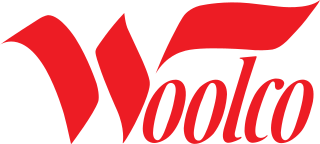
Woolco was an American-based discount retail chain. It was founded in 1962 in Columbus, Ohio, by the F. W. Woolworth Company. It was a full-line discount department store unlike the five-and-dime Woolworth stores which operated at the time. At its peak, Woolco had hundreds of stores in the US, as well as in Canada and the United Kingdom. While the American stores were closed in 1983, the chain remained active in Canada until it was sold in 1994 to rival Walmart, which was looking to enter the Canadian market. All of the former UK Woolco stores were sold by Kingfisher, who had bought the UK Woolworth business, to Gateway who subsequently sold them to Asda.
A discount store or discounter offers a retail format in which products are sold at prices that are in principle lower than an actual or supposed "full retail price". Discounters rely on bulk purchasing and efficient distribution to keep down costs.
Jamesway Corporation, more commonly known as Jamesway, was a chain of discount department stores based in Secaucus, New Jersey. It was founded in 1961 with a single store in Jamestown, New York, ultimately growing into a chain that, at its peak, operated 138 stores throughout the Northeast and mid-Atlantic regions.

Lucky Stores is an American supermarket chain founded in San Leandro, California, in 1935. Lucky is currently operated by Albertsons in Utah and Save Mart Supermarkets in Northern California.

Hills was a discount department store chain based in Canton, Massachusetts. It was founded in 1957 in Youngstown, Ohio and existed until 1999 when it was acquired by Ames. Most stores were located in Ohio, Indiana, New York, Pennsylvania and West Virginia, though the company did make a push into other markets. It pushed further south and had several stores in Virginia, Tennessee, Kentucky, and Alabama and west into Michigan.

Associated Dry Goods Corporation (ADG) was a chain of department stores that merged with May Department Stores in 1986. It was founded in 1916 as an association of independent stores called American Dry Goods, based in New York City.

Roses Discount Stores is a regional discount store in the United States with its headquarters in Henderson, North Carolina. The chain has stores in fifteen states, primarily in the South.

Peoples Drug was a chain of drugstores based in Alexandria, Virginia. Founded in 1905, Peoples was subsequently purchased by Lane Drug in 1975, Imasco in 1984, and finally by CVS in 1990, which continued to run the stores under the Peoples banner until 1994, at which time the stores were converted to CVS, marking the end of the use of the Peoples Drug name.

Gamble-Skogmo Inc. was a conglomerate of retail chains and other businesses that was headquartered in St. Louis Park, Minnesota. Business operated or franchised by Gamble-Skogmo included Gambles hardware and auto supply stores, Woman's World and Mode O'Day clothing stores, J.M. McDonald department stores, Leath Furniture stores, Tempo and Buckeye Mart Discount Stores, Howard's Brandiscount Department Stores, Rasco Variety Stores, Sarco Outlet Stores, Toy World, Rasco-Tempo, Red Owl Grocery, Snyder Drug and the Aldens mail-order company. In Canada, retail operations consisted of Macleods Hardware, based in Winnipeg, Manitoba, and Stedmans Department Stores, based in Toronto, Ontario. Gamble-Skogmo carried a line of home appliances, including radios, televisions, refrigerators, and freezers, under the Coronado brand name.
VPS Convenience Store Group was an American convenience store chain headquartered in Wilmington, North Carolina that could trace its roots to the founding of the first Village Pantry convenience store in 1966. VPS was sold in two parts in 2013 and 2015 to GPM Investments.

Fishers Big Wheel, sometimes known as just Big Wheel, was a discount department store chain based in New Castle, Pennsylvania, United States. The company operated stores under the Fisher's Big Wheel and Buy Smart names. At its peak, the chain comprised more than 100 stores in the Northeastern and Midwestern United States. The chain declared bankruptcy in 1993, selling some stores to Pamida and closing others. The chain closed in 1994.

Pick-N-Pay Supermarkets was a chain of supermarkets which operated in the Greater Cleveland, Ohio area. The company's origin can be traced to the year 1928 and the opening of a small dairy store in Cleveland Heights, Ohio by Edward Silverberg who then expanded his operation and created a chain of such stores which he called Farmview Creamery Stores. In 1938, Mr. Silverberg opened a supermarket on E. 185th Street which he called Pick-N-Pay. In 1940, he changed the name of all his stores to Pick-N-Pay Supermarkets. He grew the chain to a total of 10 stores and in 1951 sold the company to Cook Coffee Company. Under Cook Coffee's ownership, the chain continued to grow through expansion and through Pick-N-Pay's acquisition of the Foodtown supermarkets in 1959. In 1972, it was sold to a group of private investors led by Julius Kravitz, who continued the use of the brand for the newly independent company. Principal competitors in the Greater Cleveland market were the Fisher-Fazio-Costa, Stop-N-Shop, and Heinen's grocery chains.
Interstate Department Stores, Inc., was an American holding company for a chain of small department stores, founded in Delaware in 1928. After a very rapid expansion as the result of acquisition and expansion of two discount store chains acquired in 1959 and 1960 and also two toy store chains acquired in 1967 and 1969, the firm was renamed in 1970 as Interstate Stores, Inc., to better reflect its business. Increased competition and the changes in consumer buying habits eventually led to decreased sales in the late 1960s and early 1970s which forced the firm to file for bankruptcy in 1974. After shedding all of its non-performing units, the firm was able to exit bankruptcy with the entire toy division intact along with a small remnant of the department store division in 1978. The firm was renamed Toys "R" Us upon emergence from bankruptcy.

GPM Investments LLC (GPM) is a convenience store owner and operator based in Richmond, Virginia. Founded in 2003, it originally operated the Fas Mart and Shore Stop brands of convenience stores, and decided to expand.

Ontario Discount Department Store was a chain of discount department stores, which operated primarily in Ohio from the late 1950s into the 1980s. Ontario's parent company, Cook United, discontinued the use of the Ontario brand when it bought the Rink's Bargain Barn chain in 1981. The remaining Ontario stores were rebranded as Rink's or Cooks stores. Cook United closed its remaining stores in 1987.
Frederick Lawrence Haddad was a prominent Arab-American businessman who was a co-founder and President of Heck's, a major discount retail chain in West Virginia and neighboring states.










